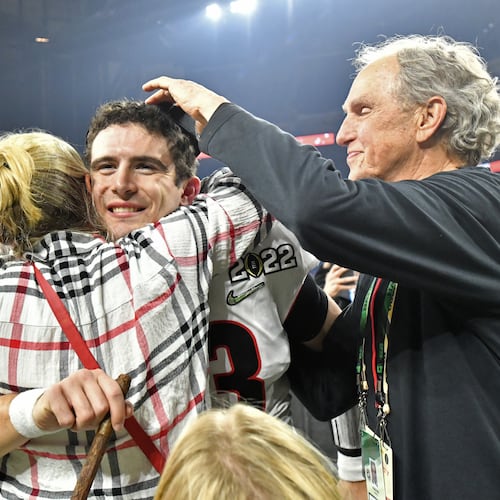To a 4-year-old growing up in New Orleans, the victories of Jesse Owens in the 1936 Berlin Olympics left a mark that lasts until today. That towering Atlantan Andrew Young is 89 now, but becomes a little boy again when telling the story of going with his father to the segregated theater to watch the newsreel of Owens owning the track to Adolf Hitler’s dismay.
That Olympics was a stage for repudiating the Nazi lie of racial superiority and for demonstrating the worldwide reach of a single strong and committed soul. As Owens soared in the unwelcoming environment of 1930s Germany, Young’s father wanted his boy to watch and learn.
“He said, see, (Owens) paid absolutely no attention to it. He just concentrated on his business and won many more gold medals (in the long jump, 100 and 200 meters, and 4x100 relay),” Young recalled.
That was one of a multitude of remembrances coming from an extended interview last month with the two men most responsible for bringing the 1996 Games to Atlanta: Young and Billy Payne. The resulting story appears in Sunday’s AJC and on AJC.com.
Payne gave birth to the movement that brought those Games to the American South while Young, the statesman and civil rights icon, gave it global legitimacy. Both men remain true believers in the Olympic ideal and the power of the Games to bring the world together and inspire us to be better, if only for a couple of weeks every four years.
That’s helpful to hear now because, gotta say, the ol’ Olympic spirit is flagging here.
It’s 25 years since Atlanta hosted the great international five-ring circus. So, happy silver anniversary to all who thought they were going to get rich renting out their homes for those 16 days – but didn’t.
As an Olympic city we’re supposed to care greatly about all facets of the great sporting quadrennial. We are bearers of the torch (that torch, the huge, mutant french-fry box that contained Atlanta’s flame is, by the way, being swallowed up by construction all around that area where the old Olympic Stadium is now hosting Georgia State football).
The coming Summer Games in Tokyo, once delayed by COVID-19 and now warped and diminished by the virus, isn’t exactly stoking the embers of joy and hope.
Foreign spectators have been banished from these games, as Japan declared a state of emergency because of rising COVID cases. In some events – such as rhythmic gymnastics and dressage, for instance – a ban may be doing people a favor. But others actually are good to watch, and the absence of fans robs from them the very pulse of competition.
Japan is getting ready to take a big bath on these Games. And not the warm, soothing, communal kind popular there.
Other electricity is missing, as well. Both the fastest American man, Atlanta’s Christian Coleman, and woman, Sha’Carri Richardson, will miss these Games after getting crossways with track and field drug enforcement. Coleman for missing drug tests. Richardson for not waiting another month before indulging in a little weed, hardly performance-enhancing unless her event was marathon giggling.
And the commercial trivialization of the sports within the Olympics continues at breakneck speed with the addition of such activities as skateboarding, sports climbing and surfing in 2021. You wonder when putting through the clown’s mouth will become an Olympic discipline.
I was surprised to learn that the men who brought the world to Atlanta don’t make it a habit of going to someone else’s Olympics. Payne never has visited any other one, and Young only briefly passed through the 2012 London Games. But not surprised at all to hear how, above it all, they still deeply believe in the value of holding these spectacles.
A word now on the Olympic idealism, just to remind us that it still breathes:
Does Payne still believe in the Olympics? “One-hundred percent,” he answered.
“It’s got complications. It’s gotten too involved in how to divide the pie, the financial strength that supports the Olympics. It’s often on very difficult territory, like the upcoming Winter Games in Beijing. I laugh at some of the solutions some of our people (propose). One of our congresspeople said we shouldn’t send any politicians from around the world to represent their country (in China). I said excuse me, that would be fine. The Olympic Games are not being put on for politicians. That’s not what they’re for.”
“It’s the only manifestation in the whole world of people coming together irrespective of their nationality, their religion, their race, competing under a common set of rules and in friendship,” Payne continued. “Because of that, it’s hopeful. It inspires people. That’s much more important than the athletic competition.”
Said Young, “The Olympics is a sports event. But it’s always had a great spiritual aspect to it. It’s an idea that the whole world can get together and stop fighting and take the competition to the athletic field.”
The Olympics persists through boycotts and bombings, protests and pandemics. It has been quarter-century since Payne and Young lured the Games here, but they can still sell the big idea.
About the Author
The Latest
Featured


